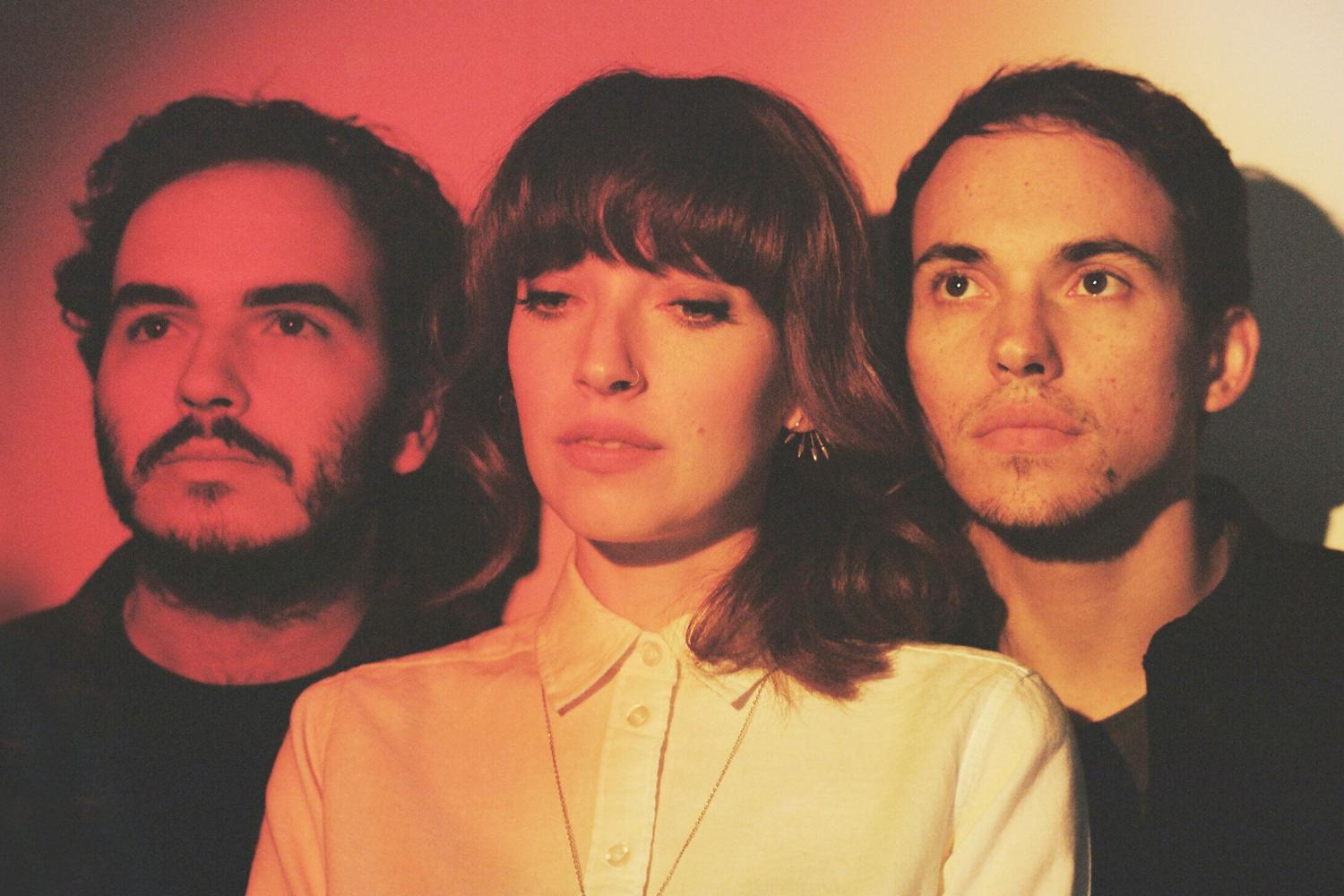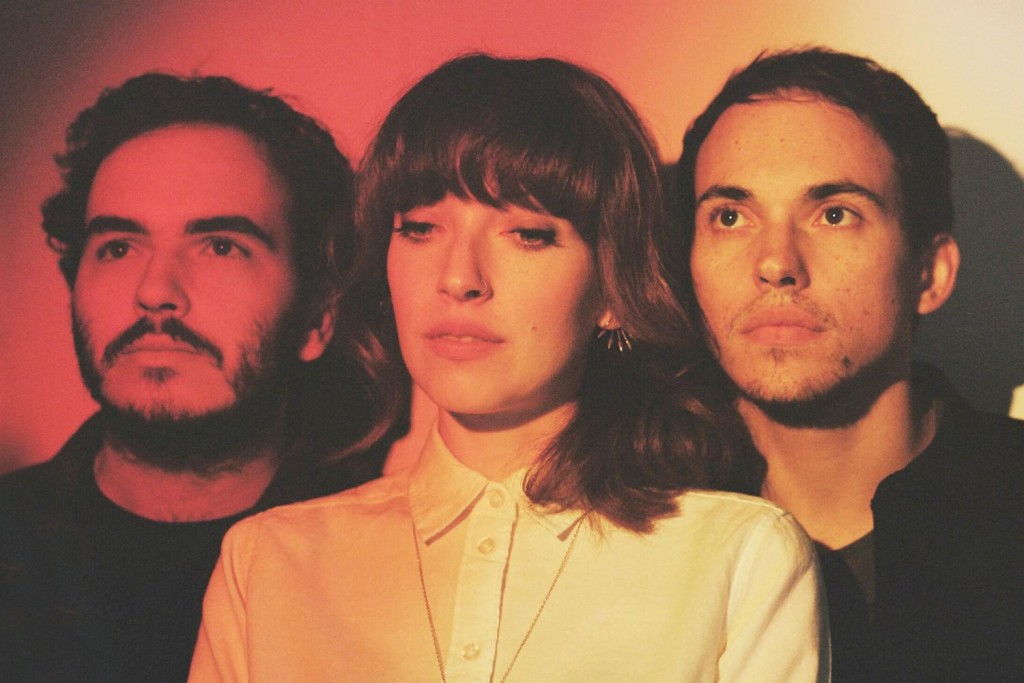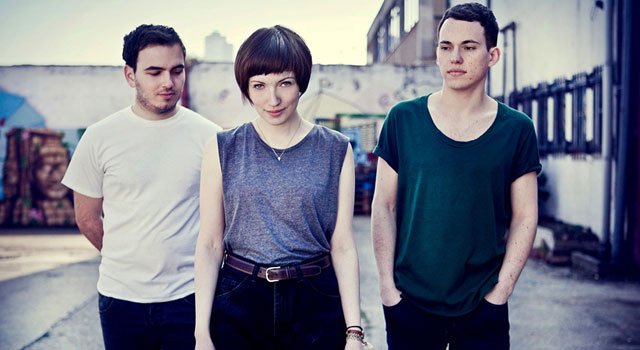Interview | Daughter talk LGBT fans and their ‘summertime’ second album

Two and a half years after the release of “If You Leave”, the debut album that cemented Elena Tonra and Igor Haefeli’s status as the respective queen and king of deep dark indie, their band Daughter return from their self-imposed exile with a comeback tour of three venues in Glasgow, London and Bristol. Brian O’Flynn caught up with them at their show in Glasgow School of Art, to discuss their music, their evolving identity and their long-awaited sophomore album, “Not to Disappear”, which is slated for release January 2016.
When I’m ushered into Daughter’s modest dressing room, I find Elena and Igor sans their drummer Remi and still bearing the burden of their five-hour train journey from London. They conceal any weariness they must be feeling and smile warmly at me, extending their hands in greeting.
I fuss around a little, gushing about their work as they settle in on the sofa. We chat a little about the venue and their experience of Glasgow. They lament their not having been able to enjoy the city as tourists, despite having played many shows here in the past. “It’s such a shame, it’s so beautiful!” says Elena. “We’re always in for maybe like a day, or even half a day, and then we leave.” The nature of touring prevents indulgences like sight-seeing, but the duo say they would love to come back and visit properly. I recommend a visit to Glasgow Necropolis, if they ever get the chance. “Ooh, I love a good graveyard!” Elena quips.
This will be the first headline UK show the band has played in quite some time. For the past year, they have been busy playing festivals, supporting Ben Howard on a slew of US tour dates and, most importantly, producing their upcoming album, Not to Disappear. This set of three UK shows is their official comeback tour, and pre-empts the extended UK tour that will begin in Cambridge on January 15th, to coincide with the album release. Given the long absence from their home country and the best part of three years that have passed since the release of their debut album, fans have a lot of pent up excitement at the band’s return. So first thing’s first – what took them so long?
“We just needed time,” explains Igor. “Obviously, we were touring so much, and we just needed some personal time, AND it took a long time to make the album as well.”
Once the band was happy that they had a “strong direction” for the new album, they recorded it in New York. “In the summer,” Elena chimes in. “Summer-time album!” she sings, animatedly.
Summery vibes are not normally associated with Daughter’s music. Elena laughs, recognising that “in relation to any other band, it’s probably not very summery at all.”
“But I’m hoping that it sounds like there’s a slight summery thing. I think dynamically it’s a lot wider and bigger than the last record. We were really trying to be totally open to every kind of instrumentation, so we used synths on this one, we’ve got some electronic stuff going on too. It’s still very much a record of our band. I don’t think we’ve really changed our sound, I hope that we’ve just built upon it.”
Both Elena and Igor are quick to emphasise that there has been a distinct shift in their lyrical style since the last album. This is certainly significant, given that the band’s success is largely built around the visceral, confessional poetry that Elena weaves into Daughter’s music.
“It freaked me out to start with,” says Elena. “I kept writing almost stream of consciousness, like prose. I was like, this is strange, what’s going on?!”
Elena’s lyricism normally groans under the weight of imagery and metaphor, comparing the slow separation of glaciers, the skeletons of trees and suffocation to the breakdown of a relationship. I ask her how she was inspired to relate the parochial melodrama of an individual relationship to such broad, existential ideas. She confesses that she is not sure herself where that urge comes from.
“I think that’s just how my brain works. I just make associations to other things, or I see a sadness in something that other people wouldn’t consider sad at all… a similarity between a situation in nature and an emotional situation. This album is maybe less like that. The motherhood thing seems to crop up a lot. I don’t know why that is!”
“I just really let it fall out. I don’t know, there might be a deep-rooted psychological reason why I associate things with nature or my mother,” she jokes.
“This album, there’s less imagery, less metaphor. I think it’s more like an open letter, it doesn’t feel like poetry. It was quite terrifying to write, to start off with. There were some songs where I thought, “Oh is this a bit too much?” I think I was making myself a little bit uncomfortable with this album, which is maybe a good thing.”
Daughter’s new take on lyricism is already evident in the single Numbers, released only a couple of weeks ago. “I feel numb”, Elena declares bluntly. The emotion on this album is not deflected on to images or concepts, but is exposed and unfiltered.
Daughter’s musical identity is obviously evolving, but in spite of all these changes and developments, the band has an impressive and enduring sense of identity. They know exactly who they are and what music they want to create. When writing Not To Disappear, they made sure not to let criticism of the last album influence their creative process.
“We shut it out. We had our own feelings about what we wanted to do, and that was already a big pressure. There wasn’t really much room for anyone else’s opinion,” Igor says.
Elena agrees. “We really tried not to overthink anything. It was good to try and block out any expectation of what people would maybe want or not want.”
They even went as far as to shut out other musical influences, in fear of potential sonic corruption.
“I guess when we were making the record we didn’t really listen to anything too much, we were trying to be in our own little bubble,” Elena says.
“We just have a strong sound, and so much is dictated by what Elena is singing about,” says Igor.
Elena is far too modest to admit her own centrality to the band, but it’s something Igor is emphatic about: Daughter centres around Elena’s artistic voice. When asked why he never writes any lyrics for Daughter, he says “I think with Daughter it’s so much about what Elena has to say, and I think when you’re the singer and you have this capability of writing great lyrics as Elena does, it just makes sense.”
Igor’s emphasis on Elena’s lyrics seems to echo many fans’ perceptions of the band. I can’t help but notice that many fans refer to Daughter as “she”, not “they”. Later on, while queuing for the Glasgow show, I witness exactly the same phenomenon while chatting to other attendees. So many people seem to conflate the band Daughter, with the individual Elena. Slightly hesitant, and nervous about offending Igor, I ask the pair if they’ve ever noticed this.
Igor, not remotely fazed, pipes up immediately. “I think it does happen. I don’t necessarily have a problem with it. I just know how the band works and I know that anyone who needs to know about it, knows. It definitely happens, but it’s hard not to have attention on such a beautiful person,” he says, glancing over at Elena – who seems more put out by the question.

“I don’t know why that happens though. We are very much a band, and I would feel terrible if anyone were to give me credit for our music, because we do everything together. We know we’re a band, we know how we write and how we work,” she says, firmly.
All this talk about identity leads me on to the topic of LGBT identity. How does Daughter relate to its relatively big gay following?
“Well, my brother’s gay,” Igor says. I make a very half-hearted attempt to disguise my excitement. I gave up hope long ago that Igor would fall in love with me and propose, but news that he has a gay, lookalike brother re-ignites all old optimism! Cue frenzied post-interview Facebook stalking.
“I’m from Switzerland and as much as it’s a free country, there’s still a prejudice. My brother and his boyfriend, [boyfriend? my heart sinks] they’ve had a few experiences where it wasn’t tolerated by certain people. But aside from those few and far between events, in general, the tolerance has always been very good.”
“But in terms of what’s still happening in the world today, it’s definitely something that we talk about often. It’s just horrifying to think that in the 21st century people still see it as a disease. Aside from those more terrible things, it’s just something that is so much part of our everyday life.”
Elena agrees. She’s eager to emphasise how much they embrace the LGBT community. “For us it’s like, so not anything! We are all the same and it’s a beautiful thing… now the work is just to make sure that everywhere, people feel equal.”
We close the interview on these heart-warming sentiments, and I leave having fallen just a little bit more in love with the pair of creative powerhouses. Come January, Daughter will be trying “not to disappear” with their new album – and this writer, for one, is sure that they won’t.
More stories:
Gay dads from Campbell’s soup ad make People’s Sexiest Men Alive list
Clean Bandit’s Neil slams ‘misogynistic’ gay men for ‘mocking idolisation’ of famous women
